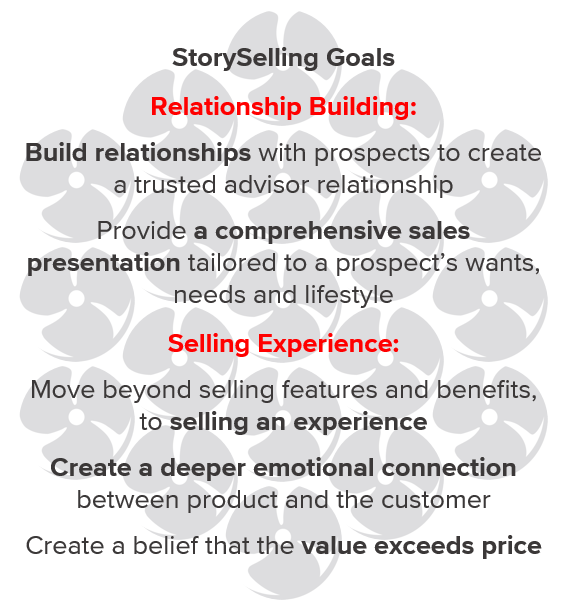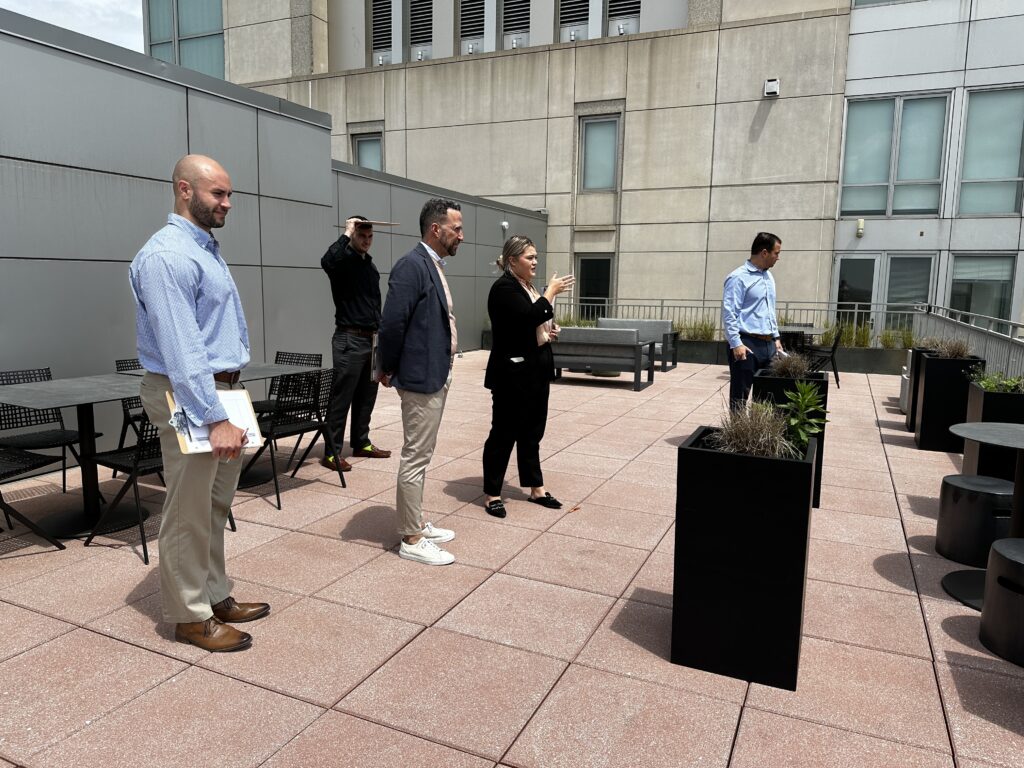The definition of insanity is doing the same thing over and over again and expecting different results.
We’re hearing it in every market we work in. From cities like Charlotte and Austin to small towns such as Washougal, Washington, everyone seems to be experiencing slow leasing traffic. And not just because it’s “the slow season.” For developers with newly launched projects in lease-up, the hand wringing is starting to cause early onset arthritis.
You may know that, prior to the incorporation of Red Propeller, many of us led sales and marketing within residential development companies. We know how critical (and yet easily overlooked) the front lines of leasing are to the success of a project. So we invested a lot of time developing an empowerment tool for leasing we call StorySelling Academy. It’s our attempt at mitigating all that potential finger destruction across the country. StorySelling Academy puts people back in the center of the leasing process. And guess what? It’s working.
Twenty-five years ago, much of the multifamily being constructed was commodity product. A luxury offering was rare. Today, almost all Class A properties – while not always targeted or differentiated – classify themselves as luxury. From coast to coast, most new developments have all the bells and whistles. While the product has improved, always-evolving technology, one-size-fits-all marketing stacks, and demands to operate lean have commoditized and templatized the prospect experience.
People seeking an apartment are making some of the largest financial decisions in their life. Yet the experience is becoming arguably the least personal it has ever been for our industry. Operators rely on fully integrated management systems, template websites have pictures and videos showing beautiful spaces overshadowed by a zillion “click me” lead generation gimmicks, and virtual leasing agents are standing by 24/7 when one of these links is inevitably (accidentally?) clicked.
 The challenge in many markets today and particularly new communities looking for strong occupancy growth is with front-line leasing. In a typical lease-up scenario, new agents are hired at the last minute, often young, new to the industry and in many cases put into leasing roles with very little training. And if they are trained, much of their training focuses on the compliance, systems, and processes, with very little attention paid to sales skills. Product knowledge and market knowledge are limited.
The challenge in many markets today and particularly new communities looking for strong occupancy growth is with front-line leasing. In a typical lease-up scenario, new agents are hired at the last minute, often young, new to the industry and in many cases put into leasing roles with very little training. And if they are trained, much of their training focuses on the compliance, systems, and processes, with very little attention paid to sales skills. Product knowledge and market knowledge are limited.
And, unfortunately, it shows. Nine times out of 10, it seems leasing tours focus on the obvious – touting features such as quartz countertops, brand new appliances (“check it out, a full-size w/d!”), clubrooms, fitness centers, and coworking spaces. And, when the tour is over, they say something like, “Oh hey, if you like it, you can go home and apply on our website!” while handing over a folder jammed with floorplans that contain chicken-scratched prices and some sort of act-now offer – probably a few weeks (months?) gratis.
In frothy markets of the past decade, the volume of traffic (demand) helped hide the lack of sales skills among leasing professionals. This isn’t the leasing team’s fault, exactly, as the sheer quantity of tours was sufficient to stabilize properties. Most operators and asset managers simply didn’t identify a need for pure sales training.
With softening demand across the country, now more than ever the quality and skills of leasing professionals are critical as projects fight for a disproportionate share of limited demand. As leasing traffic slows, the dollar sign on the forehead of every single prospect who walks into the property increases. What did it cost to get that one person to walk through the door? Can you afford to have someone walk in and not receive an A+ experience?
We developed StorySelling Academy as a solution for this last mile of leasing. It is about giving leasing teams the skills and tools they need to understand a prospect’s motivations and key drivers. Even better, it equips them with the knowledge to portray a lifestyle, the methods for telling an experience story, and the confidence to close a sale.
StorySelling Academy has two basic parts:
First, relationship building. Working with leasing agents around the country, we’ve found that many rely on technology in all parts of their lives to build and maintain relationships (think WhatsApp, TikTok, Instagram, Tinder). The downside is that many leasing professionals struggle to carry on a conversation and build a mutually appreciated relationship face to face. Don’t get us wrong, technology isn’t a bad thing; we’re not saying that. It has its place. But leasing is about people. People buy from people they like, people they feel a connection with. In our training sessions, we teach the art of discovery, which is the foundation for relationship building: finding out what matters to a person, how they live their lives, what they love to do, and what is truly important to them (spoiler alert – it isn’t the countertop material). Discovery creates a connection between the leasing professional and the prospect, and when done well it provides a clear strategy and roadmap for making the sale.
Second, StorySelling. This is the art of how we share information while on a tour. In StorySelling, the tour language shifts from pointing out features that most prospects can see and already understand to communicating with stories and describing experiences that are relevant to the prospect’s life, personality, and desires. When a tour becomes an experience that is connected to a prospect’s inner “why,” the conversation moves away from price and concessions and focuses on helping the prospect visualize what it will be like living in the community.

Checking out the features of a community during a session.
At the conclusion of a tour, we’ve also found that many leasing agents are uncomfortable closing a prospect and asking for the sale. Too often agents direct prospects back to the technology, the website and online application, allowing the prospect to delay making a decision. Additionally, personalized follow-up is rare. Post-tour communication that relates back to what the prospect cares about is even more rare. Most follow-up is handled by automated leasing systems, with the same message received by the past 80 prospects in the month.
Developing a culture of StorySelling with your on-site teams helps create a deep understanding of the product and lifestyle of the community, provides them with skills to connect with prospects on a personal level, ensures the tour experience is differentiated and compelling, and demonstrates how your community can satisfy the lifestyle each prospect is looking to achieve. Finally, your team will have the confidence to ask for the sale and increase their closing rate.
And it’s working.
StorySelling Academy can be applied to brand new communities, struggling lease-ups, and repositioning/value-add projects. While the philosophy is the same, every community and on-site team is unique. Just like your resident prospects. We strongly suggest developing a leasing experience that creates value for all that uniqueness. And we’d love to help!